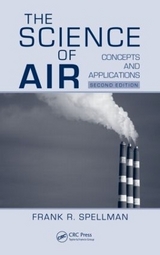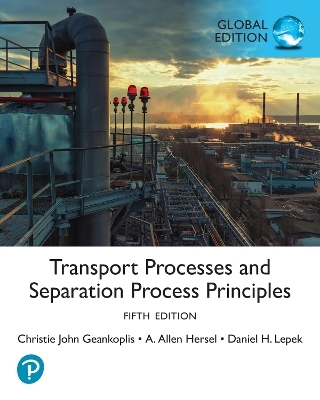
The Science of Air
Technomic Publishing Co (Verlag)
978-1-56676-715-6 (ISBN)
- Titel erscheint in neuer Auflage
- Artikel merken
The Science of Air: Concepts and Applications is a unique text devoted to every aspect of air. The study of air is closely related to other scientific disciplines, among them: chemistry, mathematics, meteorology, and physics. Through the view that air is the primary substance to most life on earth, The Science of Air presents the common themes of air resource utilization and air protection with sections on air pollution and remediation.
PART I FUNDAMENTALS
CHAPTER 1: INTRODUCTION
Setting the Stage o Scope of Text o Definition of Key Terms: Definitions o Summary o References
CHAPTER 2: ALL ABOUT AIR
Introduction o "Revolutionary" Science o The Components of Air: Characteristics and Properties: Atmospheric Nitrogen: Nitrogen: Physical Properties o Nitrogen: Uses o Nitrogen Oxides o Atmospheric Oxygen: Oxygen: Physical Properties o Oxygen: Uses o Ozone: Just Another Form of Oxygen o Atmospheric Carbon Dioxide: Carbon Dioxide: Physical Properties o Carbon Dioxide: Uses o Atmospheric Argon: Argon: Physical Properties o Argon: Uses o Atmospheric Neon: Neon: Physical Properties o Neon: Uses o Atmospheric Helium o Helium: Physical Properties o Helium Uses o Atmospheric Krypton o Krypton: Physical Properties o Krypton: Uses o Atmospheric Xenon: Xenon: Physical Properties o Xenon: Uses o Atmospheric Hydrogen: Hydrogen: Physical Properties o Hydrogen: Uses o Atmospheric Water o Atmospheric Particulate Matter o Air for Combustion o Air for Power o Summary o References
CHAPTER 3: AIR MATHEMATICS
Introduction o Units of Measurement: Units of Mass o Units of Length o Units of Volume o Units of Temperature o Units of Pressure o Units Often Used in Air Studies: Liquids, Gases/Vapors o Basic Math o Conversions of Fractions to Decimals o Powers of Ten and Scientific Notation: Powers of Ten Notation o Scientific Notation o Dimensional Analysis o Rounding Off a Number o Equations: Solving for the Unknown: Axioms o Solving Simple Equations o Checking the Answer o Setting Up Equations o Ratio and Proportion: Ratio o Proportions o Finding Averages o Percent: Percent: Practical Applications o Perimeter and Circumference o Area o Volume o Conversion Factors: Temperature Conversions o Summary o References
CHAPTER 4: AIR PHYSICS
Introduction o Force, Weight, and Mass o Pressure o Work and Energy o Diffusion and Dispersion o Compressibility o Gas Laws: Boyle's Law o Charle's Law o Ideal Gas Law o Heat and Energy in the Atmosphere o Adiabatic Lapse Rate o The Albino Rainbow o Particle Physics o Summary o References
CHAPTER 5: AIR CHEMISTRY
Introduction o Chemistry Fundamentals: What is Chemistry o Elements and Compounds o Classifications of Elements o Physical and Chemical Changes o The Structure of the Atom: Periodic Classification of the Elements o Molecules and Ions o Chemical Bonding o Chemical Formulas and Equations o Molecular Weights, Formulas, and the Mole o Physical and Chemical Properties of Matter: States of Matter o The Gas Laws o Liquids and Solutions o Thermal Properties: Specific Heat o Acids + Bases ? Salts: pH Scale o Organic Chemistry: Organic Compounds o Hydrocarbons o Aliphatic Hydrocarbons o Aromatic Hydrocarbons: Environmental Chemistry o Atmospheric Chemistry & Related Phenomena: Photochemical Reaction-Smog Production o Summary o References
PART II ATMOSPHERIC SCIENCE
CHAPTER 6: THE ATMOSPHERE
Introduction o Earth's Thin Skin: The Stratosphere o The Troposphere: Water Vapor o A Jekyll and Hyde View of the Atmosphere o Atmospheric Matter o Summary
CHAPTER 7: MOISTURE IN THE ATMOSPHERE
Introduction o Cloud Formation: Major Cloud Types o Moisture in the Atmosphere o Summary
CHAPTER 8: PRECIPITATION, EVAPOTRANSPIRATION AND PHOTOSYNTHESIS
Introduction o Precipitation: Coalescence o Bergeron Process o Types of Precipitation o Convectional Precipitation o Orographic Precipitation o Frontal Precipitation o Evapotranspiration: Evaporation o Transpiration o Evapotranspiration: The Process o Summary o References
CHAPTER 9: THE ATMOSPHERE IN MOTION
The Atmosphere in Motion o Global Air Movement o Why Do We Have Winds?: Pressure Gradient Force o Coriolis Force o Friction o Summary
CHAPTER 10: WEATHER AND CLIMATE
Introduction o Meteorology: The Science of Weather: El Nino-Southern Oscillation o The Sun: Weather Generator o Air Masses o Thermal Inversions and Air Pollution o Summary
CHAPTER 11: MICROCLIMATES
Introduction o Microclimates: Large Inland Lakes o Microclimates Near the Ground o Microclimates Over Open Land Areas o Microclimate in Woodlands or Forested Areas o Shenks's Ferry o Microclimates in Valley and Hillside Regions o Microclimates in Urban Areas o Microclimates in Seaside Locations o Summary
CHAPTER 12: THE ENDANGERED ATMOSPHERE: CLIMATIC CHANGE
Introduction o The Past: A Time of Ice o Warm Winter o What We Think We Know about Global Climate Change o What We Think We Know about Global Warming o Greenhouse Effect o Greenhouse Effect and Global Warming o Factors Involved with Global Warming/Cooling o Summary: So What Does This All Mean? o References
PART III AIR QUALITY
CHAPTER 13: AIR QUALITY
Introduction o Earth's Heat Balance o Basic Air Quality o Summary
CHAPTER 14: AIR QUALITY MANAGEMENT
Introduction o Clean Air Act (CAA): Title 1: Attainment & Maintenance of NAAQS o Title 2: Mobile Sources o Title 3: Air Toxins o Title 4: Acid Deposition o Title 5: Permits o Title 6: Ozone and Global Climate Protection o Title 7: Enforcement o Summary o References
CHAPTER 15: AIR POLLUTION
Introduction o Atmospheric Dispersion, Transformation, & Deposition: Weather o Turbulence o Adiabatic Lapse Rate o Mixing o Topography o Temperature Inversions o Plume Rise o Transport o Dispersion Models o Major Air Pollutants: National Ambient Air-Quality Standards (NAAQS) o Sulfur Dioxide (SO2) o Nitrogen Oxides (NOx) o Carbon Monoxide (CO) Volatile Organic Compounds (VOC-Hydrocarbons) o Ozone and Photochemical Smog o Carbon Dioxide o Particulate Matter o Lead o Summary o References
CHAPTER 16: AIR POLLUTION CONTROL TECHNOLOGY
Introduction o Air Pollution Control: Choices: Cedar Creek Composting o Air Pollution Control Equipment and Systems o Removal of Dry Particulate Matter: Particulate Matter o Air Pollution Control Equipment for Particulates o Gravity Settlers o Cyclone Collectors o Electrostatic Precipitators o Wet (Venturi) Scrubbers o Baghouse (Fabric) Filters o Removal of Gaseous Pollutants: Stationary Sources: Absorption o Adsorption o Condensation o Combustion o Direct-Flame Combustion (Flaring) o Thermal Combustion (Afterburners) o Catalytic Combustion o Removal of Gaseous Pollutants: Mobile Sources: Control of Crankcase Emissions o Control of Evaporative Emissions o Catalytic Converters o Summary o References
CHAPTER 17: INDOOR AIR POLLUTION
Introduction o Legionnaire's Disease o Sick Building Syndrome o A Cottage Industry Is Born o Indoor Air Pollutants: Radon o Environmental Tobacco Smoke o Biological Contaminants o Combustible Byproducts o Household Products o Pesticides o Asbestos o Air Quality Control Measures o Summary o References
AFTERWORD
| Erscheint lt. Verlag | 8.2.1999 |
|---|---|
| Verlagsort | Lancaster |
| Sprache | englisch |
| Gewicht | 531 g |
| Themenwelt | Technik ► Umwelttechnik / Biotechnologie |
| ISBN-10 | 1-56676-715-6 / 1566767156 |
| ISBN-13 | 978-1-56676-715-6 / 9781566767156 |
| Zustand | Neuware |
| Informationen gemäß Produktsicherheitsverordnung (GPSR) | |
| Haben Sie eine Frage zum Produkt? |
aus dem Bereich



